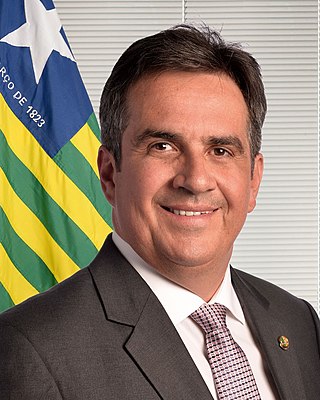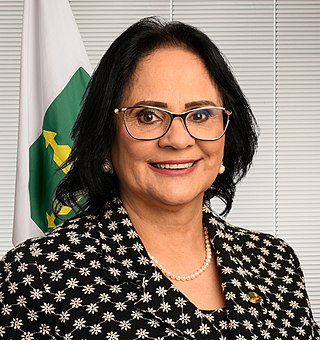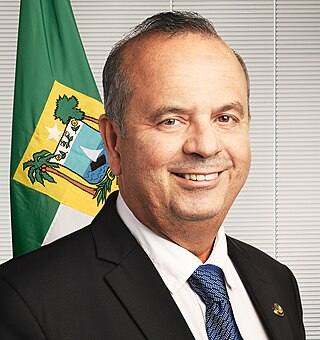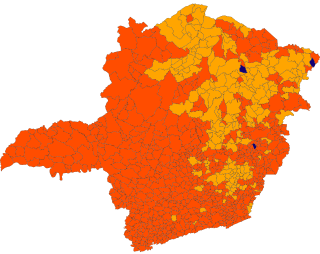
The Central Bank of Brazil is Brazil's central bank, the bank is autonomous in exercising its functions, and its main objective is to achieve stability in the purchasing power of the national currency. It was established on Thursday, 31 December 1964.
Cidadania is a Brazilian political party. It was originally founded as the Popular Socialist Party by members of the former Brazilian Communist Party (PCB), as a centre-left social democratic and democratic socialist party. Despite its left-wing alignment, PPS moved to be opposition against the Workers' Party since 2004, forming alliances with centre-right parties, in particular the Brazilian Social Democracy Party (PSDB), and supporting the Impeachment of Dilma Rousseff. Later the party's National Convention adopted the new naming in March 2019, and it was later approved by the Superior Electoral Court that September. The party then began moving towards a more social liberal position akin to the third way.

The Head of the Brazilian Imperial House is a title used by the leader of the Brazilian imperial family, currently the House of Orléans-Braganza, a descendant branch of the House of Braganza. The title of the head of the imperial house is "Emperor de jure". The current head of the imperial house is Prince Bertrand of Orléans-Braganza, who took over as head of the imperial house on July 15, 2022, after the death of his brother, Prince Luiz of Orléans-Braganza.

Podemos, previously known as the National Labour Party is a centre-right Brazilian political party. Historically labourist and Janist, since 2016 the party shifted its focus to support anti-corruption policies and direct democracy.
The Rouanet Law is a Brazilian law, named after Sérgio Paulo Rouanet, whose role is providing monetary funds for use in art and culture, including the production of movies. It is intended to encourage cultural investments and its major highlight is the tax incentive policy that enables companies and citizens to deduct a portion of income tax.

Anti-discrimination laws in Brazil are present in the Constitution of Brazil, in the labour law, in the child and adolescent law, in the ageing law, and in the penal code.
Brazilian Civil Rights Framework for the Internet is the law that governs the use of the Internet in Brazil and sets out guidelines for state action and rights and duties for users and operators.

Ciro Nogueira Lima Filho is a Brazilian lawyer, businessman, politician, and a member of the Progressistas (PP) party, of which he is the current president. He has represented Piauí in the Federal Senate since 2011. Previously, he was a Federal Deputy representing Piauí from 1995 to 2011. He is a member of Progressistas.

The University of Taquari Valley is a private research university based in Lajeado, state of Rio Grande do Sul, Brazil. It currently has 13,235 students. As of 2011, it had 404 full-time teaching staff. It offers 45 courses on the undergraduate level, 4 on the master's level and one on the doctorate (PhD) level, also counting with 28 research projects, mainly on the areas of biology, food technology and biotechnology.

Simone Nassar Tebet is a Brazilian academic, lawyer, and politician who has served as the Brazilian Minister of Planning and Budget since 5 January 2023. She previously was Senator for Mato Grosso do Sul from 2015 to 2023, Vice-Governor of Mato Grosso do Sul from 2011 to 2014, and mayor of Três Lagoas from 2005 to 2010. A member of the Brazilian Democratic Movement (MDB), of which she was the leader in the Senate from 2018 to 2019, Tebet was the MDB candidate for president in the 2022 Brazilian general election, placing third with 4.16% of the vote. After endorsing Luiz Inácio Lula da Silva, in the second round, Tebet was appointed Minister of Planning.

The 2017 labor reform in Brazil was a significant change in the country's Consolidation of Labor Laws. According to the government, the goal of the reform was to combat unemployment and the still ongoing 2014 Brazilian economic crisis.

Damares Regina Alves is a Brazilian lawyer and evangelical pastor.

The 56th Legislature of National Congress was a meeting of the legislative branch of the Federal Government of Brazil, composed by the Federal Senate and the Chamber of Deputies. It convened in Brasília on 1 February 2019, a month after the beginning of Jair Bolsonaro's only term as president, and ended on 31 January 2023.

Omri Ferradura Breda, commonly known as Mestre Ferradura, is a Mestre de Capoeira, pedagogue, president of the Brazilian Institute of Capoeira Education, and director of the Brincadeira de Angola project.

Rogério Simonetti Marinho is a Brazilian economist and politician, member of the Liberal Party (PL). He's currently a senator representing Rio Grande do Norte since 2023. He was a Federal Deputy until 1 February 2019, representing the state of Rio Grande do Norte, and was the President of Honor of the Brazilian Social Democracy Party (PSDB) in his state.

The 2022 Minas Gerais state elections took place in the state of Minas Gerais, Brazil on 2 October 2022. Voters elected a governor, vice governor, one senator, 53 representatives for the Chamber of Deputies, and 77 Legislative Assembly members. The incumbent governor, Romeu Zema, a member of the New Party, was eligible for a second term, and intended to run for reelection.

The 57th Legislature of National Congress is the current meeting of the legislative branch of the Federal Government of Brazil, composed by the Federal Senate and the Chamber of Deputies. It convened in Brasília on 1 February 2023, a month after the inauguration of the winner of the 2022 presidential election.

Cleiton Gontijo de Azevedo, often referred to as just Cleitinho, is a Brazilian businessman, musician, and politician. He has been a senator from the state of Minas Gerais since 2023. He previously served as a state deputy in Minas Gerais, as well as a councilman in his hometown of Divinópolis. He is currently affiliated with the Republicanos.
Isabella Gonçalves Miranda, better known as Bella Gonçalves, is a Brazilian political scientist and politician. She served as a city councilor in Belo Horizonte representing the Socialism and Liberty Party (PSOL). Isabella also held the position of president of the city section of PSOL and was an active member of the Brigadas Populares, advocating for the right to the city. Notably, she became the first openly lesbian city councilor in Belo Horizonte. She was elected as a State Representative of Minas Gerais in 2022.

Marcos Ribeiro do Val is a Brazilian gun instructor, speaker, politician and former military, member of Podemos (PODE). In the 2018 state election, he was elected senator for Espírito Santo.














